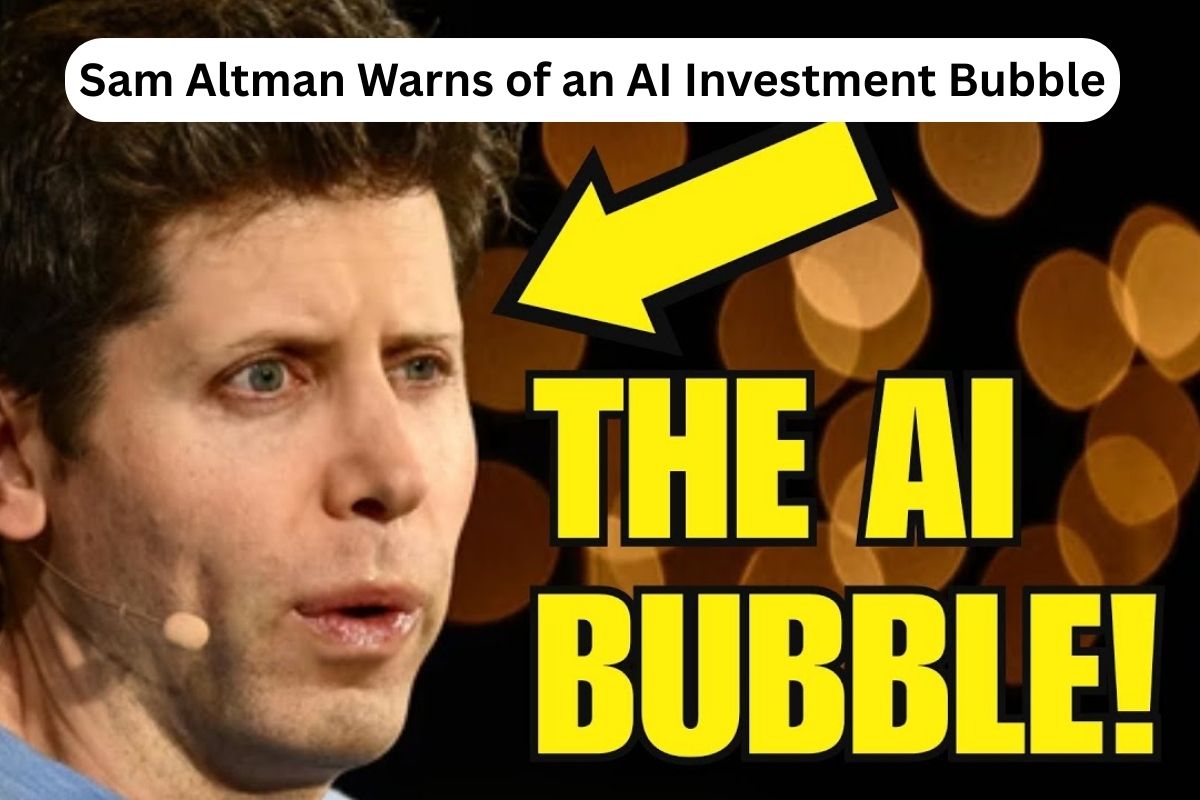Artificial Intelligence is often described as the defining technology of our time, but OpenAI CEO Sam Altman has issued a cautionary note. In recent remarks, Altman compared today’s AI investment frenzy to the dot-com bubble of the late 1990s, warning that unchecked speculation could lead to painful corrections for startups, investors, and the broader tech industry.
His comments have sparked a debate across Silicon Valley, Wall Street, and global policy circles: Is AI headed for a bubble burst—or is this simply the price of rapid innovation?
Altman’s Concerns: AI Hype Outpacing Reality
Altman, who helped steer OpenAI into becoming one of the most influential AI labs in the world, believes that current levels of capital flowing into AI may be unsustainable. Billions are being invested into new AI companies every quarter, with startups valued at enormous sums—sometimes before they have a clear product-market fit.
He notes three core risks fueling this potential bubble:
- Overvaluation of AI Startups – Many companies are raising funds at inflated valuations.
- Unproven Business Models – Startups often chase hype rather than sustainable products.
- Excessive Speculation – Investors fear missing out and pour money into any AI-related venture.
Echoes of the Dot-Com Crash
Industry veterans recall how the dot-com bubble in the late 1990s saw massive investments in internet companies—many of which collapsed when revenue failed to materialize. Altman suggests the AI industry risks repeating that cycle unless it focuses on building real-world value and long-term sustainability.
Just as many internet firms disappeared after 2000, a significant number of AI startups may not survive if the hype fades. However, just as the internet ultimately reshaped the world, AI too may deliver lasting transformation—though perhaps after a correction.
Where the Money Is Flowing
Recent reports show that:
- AI companies have raised over $50 billion globally in 2024 alone, a record pace.
- Valuations of early-stage startups have sometimes tripled in months, despite limited revenue.
- Tech giants such as Microsoft, Google, and Meta continue to invest billions in AI infrastructure.
This rush of capital is driving rapid innovation, but Altman warns it also creates unrealistic expectations that every AI venture will succeed.
Table: Comparing Past and Present Tech Investment Bubbles
| Aspect | Dot-Com Bubble (1990s) | AI Boom (2020s) |
|---|---|---|
| Hype Driver | Internet revolution | Artificial Intelligence |
| Investment Scale | ~$100B by 2000 | $50B+ in 2024 alone |
| Startup Valuations | Inflated, often pre-revenue | Inflated, often pre-product |
| Market Correction | Major crash in 2000–2001 | Possible correction ahead |
| Survivors | Amazon, Google, eBay | OpenAI, Anthropic, DeepSeek? |
Why Altman’s Warning Matters
Sam Altman is not just another voice in the AI debate—he is one of the central figures shaping the industry. His leadership at OpenAI has been instrumental in the creation of GPT models that sparked the current AI revolution.
By warning of an investment bubble, Altman is signaling that responsibility and caution are needed, not only from investors but also from entrepreneurs eager to ride the AI wave.
The Optimistic View: Growth With Corrections
Some analysts argue that while a bubble may exist, it is not entirely negative. Investment bubbles often fuel infrastructure and innovation that eventually prove useful, even after many companies fail.
For instance, the dot-com bubble helped fund the backbone of the modern internet. Similarly, even if many AI startups collapse, the capital being poured into GPUs, cloud infrastructure, and AI research could benefit society in the long run.
Sam Altman’s warning about an AI investment bubble is timely. The hype around AI is undeniable, but unchecked speculation risks undermining the technology’s true potential. If history is a guide, the industry may face corrections—but in the long run, AI could prove just as transformative as the internet revolution.
FAQs on the AI Investment Bubble
Q1. What does Sam Altman mean by an AI bubble?
He warns that AI startup valuations and investments are inflated, and may not be sustainable.
Q2. Will the AI bubble burst like the dot-com crash?
It’s possible. Some companies may fail, but lasting players could still reshape industries.
Q3. Why are investors pouring money into AI?
Because AI is seen as transformative, with applications across healthcare, finance, education, and more.
Q4. Is investing in AI still smart?
Yes, but experts suggest focusing on sustainable, revenue-generating AI companies, not just hype-driven ventures.
Q5. What could prevent a bubble burst?
Better regulation, realistic valuations, and focusing on long-term AI applications could stabilize the industry.
